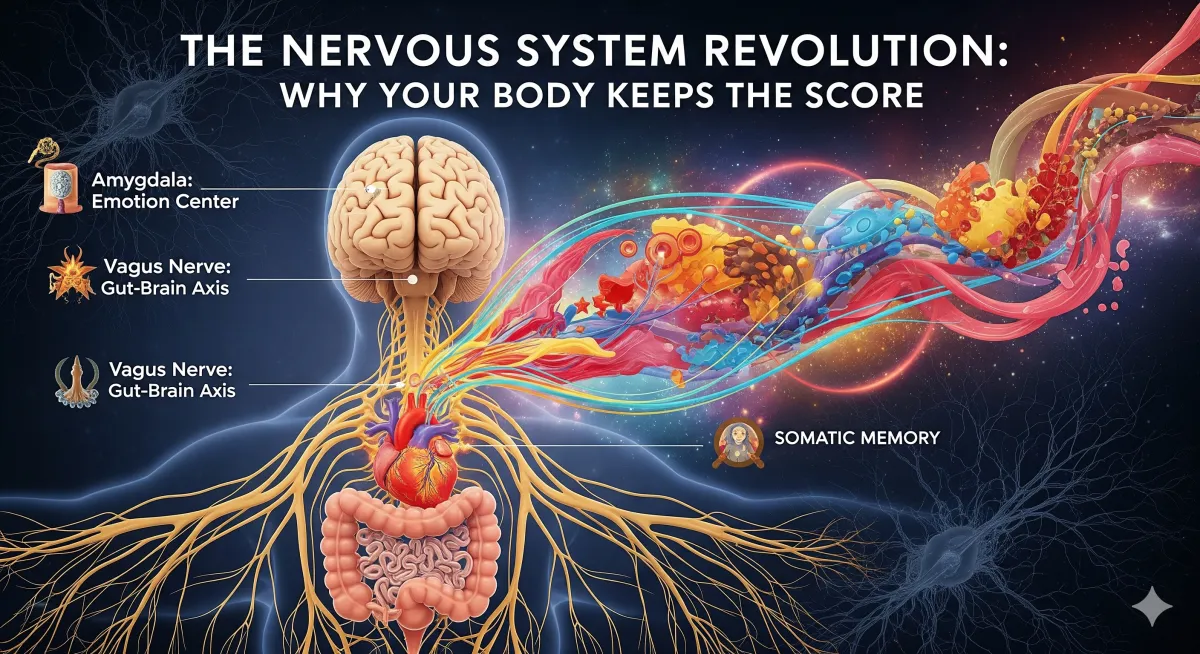
The Nervous System Revolution: How Your Body Keeps Score and Why It Matters for Mental Health
TL;DR - Quick Summary
Your nervous system constantly communicates with the world, and for neurodivergent individuals and marginalized communities, it often stays in high alert mode. This chronic hypervigilance affects sleep, digestion, relationships, and overall wellbeing. The good news? Small changes in nervous system regulation create big improvements across all life areas.
Key takeaways:
Nervous system dysregulation isn't your fault—it's a protective response
SOMA Breathwork and sound healing are effective, neurodivergent-friendly tools
Your sensitivity can become a superpower with proper nervous system support
Small daily practices (conscious breathing, body awareness, boundaries) create lasting change
Professional support accelerates healing but isn't always necessary to start
Bottom line: Your nervous system revolution begins with one conscious breath and the understanding that your body holds wisdom—it just needs the right tools to find balance.
Understanding Your Nervous System: The 24/7 Conversation Your Body Has with the World
Your nervous system is constantly communicating with the world around you, processing thousands of signals every second. For neurodivergent individuals and members of the QTPOC community, this internal dialogue often becomes amplified, creating a heightened state of awareness that can be both protective and exhausting.
What Is Nervous System Dysregulation?
Nervous system dysregulation occurs when your body's natural stress response becomes stuck in a state of high alert. This condition affects millions of people worldwide, particularly those who have experienced trauma, discrimination, or chronic stress. When your nervous system is dysregulated, it impacts every aspect of your health and wellbeing.
The Hidden Cost of Hypervigilance: How Chronic Stress Affects Your Body
When was the last time you felt truly, deeply safe? Not just physically secure, but emotionally and energetically free to express your authentic self? For many people, especially those from marginalized communities, this feeling of complete safety is rare.
Signs Your Nervous System Needs Attention
Difficulty sleeping or staying asleep
Digestive issues and stomach problems
Feeling "wired but tired" throughout the day
Struggling with personal boundaries
Feeling disconnected from your body
Reduced creativity and problem-solving abilities
Relationship challenges and communication difficulties
This constant state of alertness isn't a personal failing—it's your nervous system doing what it's designed to do: protect you. However, when hypervigilance becomes your default setting, it can significantly impact your quality of life.
The Science Behind Nervous System Regulation
Understanding how your nervous system works is the first step toward healing. Your autonomic nervous system has two main branches:
The Sympathetic Nervous System (Fight or Flight)
This system activates during perceived threats, releasing stress hormones like cortisol and adrenaline. While essential for survival, chronic activation can lead to burnout and health problems.
The Parasympathetic Nervous System (Rest and Digest)
This system promotes healing, digestion, and restoration. When functioning properly, it helps you feel calm, connected, and capable of joy.
Revolutionary Approaches to Nervous System Healing
SOMA Breathwork: A Neurodivergent-Friendly Practice
SOMA Breathwork offers a unique approach to nervous system regulation that works particularly well for neurodivergent minds. Unlike rigid breathing exercises, SOMA works with your body's natural rhythms and preferences.
Benefits of SOMA Breathwork:
Reduces anxiety and stress levels
Improves sleep quality
Enhances emotional regulation
Increases energy and vitality
Supports trauma healing
Promotes self-awareness and mindfulness
The practice isn't about controlling your breath—it's about letting your breath guide you toward release, pleasure, and a deeper connection with yourself.
Sound Healing: Using Frequency for Nervous System Reset
Sound healing has gained recognition as an effective tool for nervous system regulation. The therapeutic use of sound frequencies can help shift your nervous system from a state of stress to one of calm and restoration.
How Sound Healing Works:
Crystal bowls and singing bowls produce specific frequencies
These vibrations help synchronize brainwaves
The nervous system responds by shifting into parasympathetic mode
Mental chatter quiets, allowing for deeper relaxation
For individuals whose minds rarely quiet, sound can serve as a bridge back to body awareness and present-moment connection.
The Ripple Effect: How Small Changes Create Big Transformations
One of the most encouraging aspects of nervous system work is how small, consistent changes can create significant improvements across all areas of life.
The Positive Feedback Loop of Regulation
When you learn to regulate your nervous system:
Sleep improves - Better rest leads to improved cognitive function
Stress resilience increases - You develop greater capacity for handling challenges
Relationships strengthen - Improved emotional regulation enhances communication
Creativity flourishes - A calm nervous system supports innovative thinking
Joy becomes accessible - You create space for positive emotions and experiences
Transforming Sensitivity into Strength
Many highly sensitive individuals and neurodivergent people have been told their sensitivity is a weakness or something to overcome. Nervous system work offers a different perspective: what if your heightened sensitivity is actually a superpower?
Reframing Hypervigilance as Heightened Intuition
The same nervous system qualities that can feel overwhelming in unsafe environments can become tremendous assets when properly supported:
Enhanced pattern recognition
Increased empathy and emotional intelligence
Greater awareness of subtle environmental changes
Ability to sense others' emotional states
Creative problem-solving abilities
Practical Steps to Begin Your Nervous System Revolution
Daily Practices for Nervous System Health
Conscious Breathing: Start with just 5 minutes of intentional breathing daily
Body Awareness: Practice checking in with physical sensations throughout the day
Boundary Setting: Learn to recognize and honor your limits
Grounding Techniques: Use your senses to connect with the present moment
Movement: Gentle, mindful movement helps discharge stored tension
Creating Safety in Your Environment
Your external environment significantly impacts your nervous system. Consider:
Reducing sensory overwhelm when possible
Creating calm, organized spaces
Establishing predictable routines
Building supportive relationships
Limiting exposure to triggering content or situations
The Path Forward: From Survival to Thriving
Nervous system healing isn't about becoming someone different—it's about becoming more authentically yourself. Your nervous system naturally wants to support your fullest expression, deepest creativity, and most genuine connections. It simply needs the right tools and guidance to do so effectively.
Professional Support Options
While self-practice is valuable, working with qualified professionals can accelerate your healing journey:
Somatic therapists
Trauma-informed coaches
SOMA Breathwork facilitators
Sound healing practitioners
Nervous system specialists
Conclusion: Your Journey to Nervous System Wellness
Your nervous system revolution begins with a single conscious breath. Each moment of awareness, each practice session, and each small step toward regulation contributes to your overall wellbeing and resilience.
Remember that healing isn't linear, and everyone's journey looks different. What matters most is that you're taking steps to understand and support your unique nervous system needs. With patience, practice, and the right tools, you can transform chronic stress into strength, hypervigilance into intuition, and sensitivity into your greatest asset.
Your body holds profound wisdom. When you provide it with the proper tools and support, it knows exactly how to find balance and guide you toward your most authentic, joyful life.
Frequently Asked Questions (FAQ)
What is nervous system dysregulation?
Nervous system dysregulation occurs when your body's stress response system gets stuck in "high alert" mode. Instead of naturally shifting between states of activation and rest, your system remains hypervigilant, affecting sleep, digestion, mood, and relationships. This often develops as a protective response to trauma, discrimination, or chronic stress.
How do I know if my nervous system is dysregulated?
Common signs include: difficulty sleeping or staying asleep, digestive issues, feeling "wired but tired," struggling with boundaries, feeling disconnected from your body, reduced creativity, and relationship challenges. You might also notice being easily startled, having racing thoughts, or feeling overwhelmed by everyday situations.
What is SOMA Breathwork and how is it different from regular breathing exercises?
SOMA Breathwork is a specific breathing technique that works with your body's natural rhythms rather than imposing rigid patterns. Unlike traditional breathing exercises that might feel too structured for neurodivergent minds, SOMA allows your breath to guide the process, focusing on release, pleasure, and reconnection with yourself.
Can sound healing really help my nervous system?
Yes, sound healing uses specific frequencies from instruments like crystal bowls and singing bowls to help shift your nervous system from stress mode to calm mode. The vibrations help synchronize brainwaves and activate the parasympathetic nervous system, which promotes rest, healing, and restoration.
Is nervous system work safe for neurodivergent people?
Absolutely. In fact, many nervous system healing modalities are particularly beneficial for neurodivergent individuals because they work with your natural patterns rather than against them. SOMA Breathwork, for example, is less rigid than traditional practices and allows for individual differences in processing and response.
How long does it take to see results from nervous system work?
Many people notice immediate benefits after their first conscious breathing session or sound healing experience, such as feeling calmer or sleeping better that night. However, lasting changes typically develop over weeks to months of consistent practice. Small shifts often create ripple effects that build over time.
Do I need professional help to start working with my nervous system?
While working with qualified professionals (somatic therapists, trauma-informed coaches, SOMA facilitators) can accelerate healing, you can begin with simple daily practices like conscious breathing, body awareness exercises, and creating safer environments. Start where you feel comfortable and seek professional support when ready.
What's the difference between the sympathetic and parasympathetic nervous systems?
The sympathetic nervous system activates your "fight or flight" response during perceived threats, releasing stress hormones like cortisol and adrenaline. The parasympathetic system promotes "rest and digest" mode, supporting healing, restoration, and feelings of safety. Healthy nervous system regulation involves moving fluidly between these states as needed.
Can nervous system work help with trauma?
Yes, nervous system regulation is a fundamental component of trauma healing. However, trauma work should ideally be done with qualified professionals, especially for complex or severe trauma. Nervous system practices can provide valuable tools for managing symptoms and building resilience alongside therapeutic work.
How can I create a more nervous system-friendly environment?
Simple changes include: reducing sensory overwhelm when possible, creating organized and calm spaces, establishing predictable routines, building supportive relationships, limiting exposure to triggering content, using soft lighting, incorporating natural elements, and having designated quiet spaces for regulation practices.
What if I'm too sensitive for group classes or workshops?
Many nervous system practices can be done privately or in small, carefully curated groups. Online sessions, one-on-one work, or self-guided practices at home are all valid options. Your sensitivity isn't a barrier—it's information about what you need to feel safe while healing.
Is it normal to feel emotional during nervous system work?
Yes, emotional releases are common and normal during nervous system regulation practices. Your body may release stored emotions, memories, or tension that's been held in your system. This is often a sign that healing is happening, though it's important to work at a pace that feels safe and manageable for you.
Ready to start your nervous system healing journey? Contact us to explore SOMA Breathwork, sound healing, and working with a qualified somatic practitioner to begin creating the safety and regulation your body craves.


